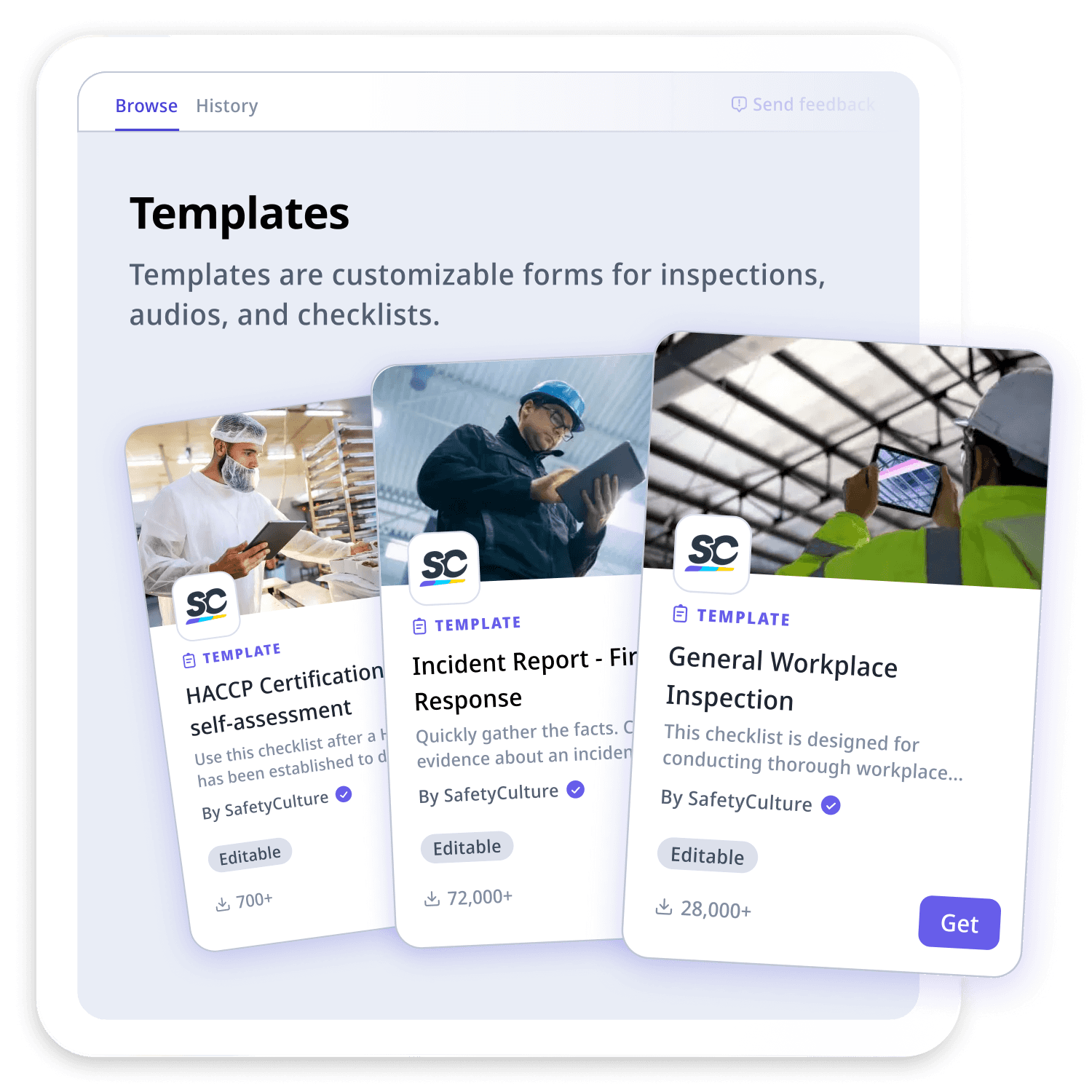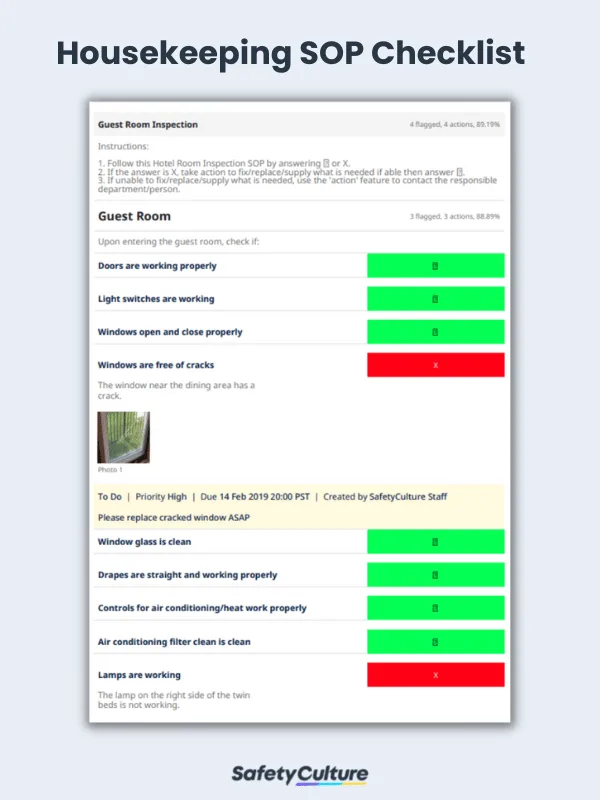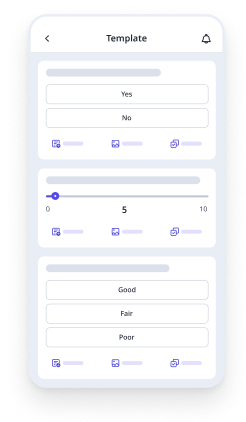Published 20 Oct 2025
Article by
6 min read
What is a Housekeeping SOP Checklist?
A Housekeeping SOP Checklist is a step-by-step guide that helps your team maintain cleanliness, organization, and safety across your property. It outlines what needs to be done, how often, and who’s responsible, ensuring every room, corridor, and common area meets your brand standards. It’s a simple way to keep your facilities running smoothly, protect your brand reputation, and deliver a consistently great guest experience.
What is a Housekeeping SOP?
A housekeeping SOP (Standard Operating Procedure) is a documented, step-by-step instructions for effectively performing various housekeeping tasks. This includes daily cleaning activities and regular maintenance procedures. SOPs in housekeeping are primarily used by hotel supervisors to help housekeepers and commercial cleaners uphold housekeeping standards, ensure consistent quality of service, and enhance guest experiences that lead to positive reviews.
Why Implement Housekeeping SOPs?
Housekeeping SOPs are critical because they uphold the standards of an organization’s housekeeping procedures. The benefits of having cleaning standard operating procedures include:
Continuous Education – It can be used as a teaching tool to educate workers on the correct housekeeping procedures and keep them updated regarding any process changes.
Accountability – SOPs in housekeeping encourage compliance with organizational standards through accountability. They provide intuitive, easy-to-follow steps to avoid any discrepancy or misunderstanding.
Branding – Maintaining high standards of housekeeping procedures is the first step toward maintaining credibility with customers by providing a consistent customer experience.
Improved compliance rates – Clear and defined housekeeping SOPs help ensure that an organization’s processes comply with health and safety laws .
Common Housekeeping Standard Operating Procedures
Housekeeping standard operating procedures (SOP) contain industry best practices that organizations use as a guideline for employees. Depending on the scope, a housekeeping SOP may contain specific instructions for a specific industry. But below are common areas that a housekeeping SOP includes:
Attendance Management
Part of housekeeping procedures is managing the manning of employees. This area specifically covers the expected schedule of teams and lays out the policies in handling leaves and absences of employees.
Area of Responsibility
SOP should outline the roles and responsibilities of the employees. This will help avoid confusion in the activities a role is responsible for. Also, it makes it easy to identify point persons for each area or department should inspections or investigations be carried out.
Waste Management
Depending on where you are, proper waste management methods are required to be practiced by local organizations. Housekeeping businesses must comply with these standards to avoid the consequences of non-compliance. Get familiar with local standards and apply them within your standard operating procedures. If necessary, organizations may include additional instructions for managing waste in their SOPs.
Discipline
This refers to general best practices and code of conduct that employees are expected to abide by. For example, wearing the proper uniform, ID Cards, and necessary PPEs like masks and gloves.
Checklist Management
In most cases, checklists are used by housekeepers to record and monitor the activities performed in the facility. These records are important as they serve as proof of the work performed. Instructions regarding the management of checklists can be added to the SOP to better guide members and supervisors on how this can be effectively carried out.
Hotel Housekeeping Procedures
Housekeeping procedures (SOPs), for hotels in particular, are important in the hospitality industry because cleanliness is a basic expectation of guests. There are two types of cleaning procedures for hotel housekeeping:
Manual
This is a cleaning method that doesn’t require the assistance of equipment and machines, it includes the following:
Sweeping
Dusting
Mopping
Scrubbing
Polishing
Spot cleaning
Mechanized
As the name suggests, this type of cleaning needs the assistance of mechanized or electrical equipment, including the following:
Laundering
Dry cleaning
Spray buffing
Vacuum cleaning
Suction cleaning
Housekeeping SOP Examples
Well-implemented hotel housekeeping SOPs can help establish a welcoming atmosphere for the guests and ensure reliable and courteous service from staff. Here are some of the best hotel SOPs for three of the most common housekeeping room status:
1. Room for Check-In
These are standard housekeeping procedures for hotel staff when preparing rooms for new set of guests:
Make bed with fresh linen and pillow cases.
Check power switches and other electronic appliances for any damages.
Clean up ashtrays and trash bins.
Restock desk stationery and vanity supplies
Clean the bathroom: floor, walls, toilet, shower area, and tub.
2. Occupied
Perform the following sample proper housekeeping procedures for an occupied room and use the housekeeping SOP checklist to record task completion:
Clear the dustbins.
Collect and replace used bedroom and bathroom linen.
Make the bed.
Vacuum floor carpets and rugs.
Clean the bathroom and replenish bathroom supplies.
3. Room for Check-out
It can be used as a teaching tool to educate workers on the correct housekeeping procedures and keep them updated regarding any process changes.
Assemble bed, chairs, settees, and other furniture and placing it appropriately.
Wipe guest room floor with a wet mop.
Cleaning the writing tables, assembling and placing stationery appropriately.
Check for any articles the guest left behind.
Clean bathroom equipment and ensure adequate supply of toiletries according to SOPs for bathroom cleaning.
Clean all electric appliances such as microwave, fan, refrigerator, and others.
A sample of a step-by-step housekeeping sop pdf can be found here.
Housekeeping For Other Industries
Housekeeping SOP is not limited to hotels, it also applies to other industries such as manufacturing, medical, education, and construction, amongst others. It helps maintain a safe and secure environment not just for customers but for employees as well. Here’s how housekeeping SOP helps the following businesses:
Housekeeping SOP for hospitals – A hospital housekeeping SOP aims to maintain a sterile environment in all areas of the hospital. It guides cleaning personnel in prioritizing the tasks to maintain high standards of cleanliness, especially in crucial areas including high-touch surfaces and high-risk areas.
Housekeeping SOP for restaurants – A restaurant housekeeping SOP ensures high standard cleaning operations to avoid food contamination and foodborne illnesses. It helps restaurants build exceptional ambiance and cleanliness to impress their clients.
Housekeeping SOP for warehouses – A warehouse housekeeping SOP helps maintain a clean workplace that is free of debris and clutter to keep a safe environment. It helps prevent workplace hazards including incidents, near misses, and injuries.

With digitized cleaning and housekeeping checks centralized in one single location, it allowed Butlin’s to keep track of everything across their sprawling resorts.


Still looking for a checklist?
Search, filter, and customize 60,000+ templates across industries and use cases.

